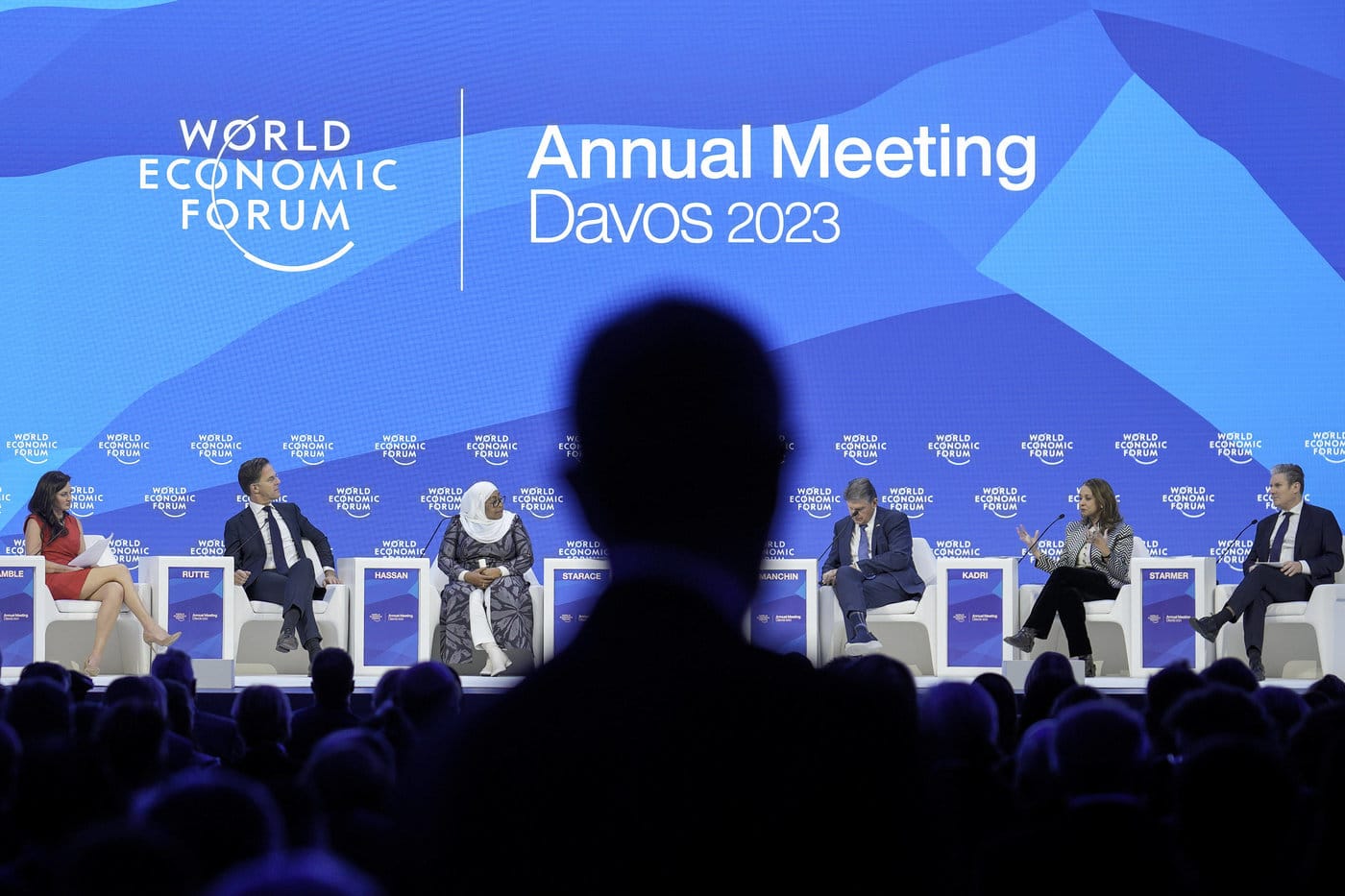[vc_row njt-role=”people-in-the-roles” njt-role-user-roles=”administrator,editor,author,armember”][vc_column][vc_column_text]
The latest 2023 edition of the Davos Forum saw some policymakers, including Nobel laureate Al Gore, sounding the alarm about a climate change battle “being lost.” But two economic researchers delivered a more optimistic view of the subject, saying that AI should accelerate the green revolution.
As it has done every year for the past 52 years, the Davos Forum brought together hundreds of CEOs and representatives of the political and economic world in the famous Swiss ski resort. And this time again, from January 16 to 20, the world economic meeting has set itself the ambition to “promote positive long-term system change through public/private dialogue of world leaders to improve the state of the world“.
Many observers agreed, however, that it was particularly difficult for the Davos speakers to get a positive message across when the global situation – against the backdrop of inflation, the continuing war in Ukraine, and the risk of a worldwide recession – was highly combustible.
It is not surprising that in such a context, one could hear very opposite projections regarding a major concern, namely the battle against global warming.
A lost battle for the climate?
For Al Gore, the former American vice-president and Nobel Peace Prize winner for his climate action, and António Guterres, the UN secretary-general, the hour is more than serious… “We are not winning the battle. Emissions are going much faster than the solutions we should be implementing,” said Guterres on January 18 before the assembly of the world’s leaders. He also did not hesitate to ask “how to explain to young activists that the president of the COP28 (i.e. the minister of industry of Abu Dhabi, head of the national oil company of this emirate) is the head of an oil company?” and how “to hope to talk about the decrease of fossil fuel production while letting oil and gas companies reduce the smallest bit of climate regulation? Colombia’s leftist President António Guterres drove the point home by denouncing a “climate crisis entirely due to the economic myth that is capitalism.”
AI’s role in saving the world
But two other speakers offered an entirely different perspective. In a joint paper, Nicholas Stern and Mattia Romani, respectively an expert on the economics of climate change and a researcher at the London School of Economics and Political Science, defended the potential saving role of AI (Artificial Intelligence) in climate change.
The two researchers even envision for the world “a new growth and development story driven by investment and innovation in green technologies, driven by AI.”
Already used in crop analysis and improved climate disaster warning systems, the duo says AI will facilitate decarbonization by accelerating “tipping points and the deployment of cutting-edge technologies across economic sectors – such as fusion and solar, quantum chemistry, alternative protein design, and many others.”
General purpose technology
According to the Nicholas Stern-Mattia Romani duo, more than half of the tipping points for key green technologies will be reached in the next five years. The cost of power generation for solar and wind, including near-term battery storage, will be lower than new coal and gas in the U.S. as early as 2023, and soon thereafter in other countries.
Unsubsidized battery electric vehicles, meanwhile, are expected to achieve cost parity with ICE vehicles in all light-duty vehicle segments of the market by 2025-2026.
In short, AI is said to be on the verge of becoming a general-purpose technology, the equivalent of electricity or computers, “likely to end a long period of low growth and low productivity.”
This new revolution, the most important since the previous one, the so-called industrial revolution, will require investments equal to the challenge: $5 to $7 billion per year until 2030.
Recession or global growth?
Pessimism or optimism? In terms of forecasts, too, the Davos forum has succeeded in shaking up the certainties.
At the beginning of January, the International Monetary Fund (IMF) estimated that a global recession (i.e. an increase in GDP of less than 2%) was “possible at 25%”, even if a limited growth of 2.7% seemed more likely.
However, at the end of the month, it should finally revise upwards its growth estimate. At the closing session of the Davos Forum, Kristalina Georgieva, the IMF’s managing director, said she was relieved by this new outlook. But “less bad does not mean good”, she also stressed. Seeing the glass as half full or empty is a hackneyed phrase. But it remains valid even among the greatest decision-makers, as the last Davos Forum showed us…
Read also > “Cooperation in a fragmented world” at the dawn of a new world order
Featured photo : ©Press[/vc_column_text][/vc_column][/vc_row][vc_row njt-role=”not-logged-in”][vc_column][vc_column_text]
The latest 2023 edition of the Davos Forum saw some policymakers, including Nobel laureate Al Gore, sounding the alarm about a climate change battle “being lost.” But two economic researchers delivered a more optimistic view of the subject, saying that AI should accelerate the green revolution.
As it has done every year for the past 52 years, the Davos Forum brought together hundreds of CEOs and representatives of the political and economic world in the famous Swiss ski resort. And this time again, from January 16 to 20, the world economic meeting has set itself the ambition to “promote positive long-term system change through public/private dialogue of world leaders to improve the state of the world“.
Many observers agreed, however, that it was particularly difficult for the Davos speakers to get a positive message across when the global situation – against the backdrop of inflation, the continuing war in Ukraine, and the risk of a worldwide recession – was highly combustible.
It is not surprising that in such a context, one could hear very opposite projections regarding a major concern, namely the battle against global warming.
A lost battle for the climate?
For Al Gore, the former American vice-president and Nobel Peace Prize winner for his climate action, and António Guterres, the UN secretary-general, the hour is more than serious… “We are not winning the battle. Emissions are going much faster than the solutions we should be implementing,” said Guterres on January 18 before the assembly of the world’s leaders. He also did not hesitate to ask “how to explain to young activists that the president of the COP28 (i.e. the minister of industry of Abu Dhabi, head of the national oil company of this emirate) is the head of an oil company?” and how “to hope to talk about the decrease of fossil fuel production while letting oil and gas companies reduce the smallest bit of climate regulation? Colombia’s leftist President António Guterres drove the point home by denouncing a “climate crisis entirely due to the economic myth that is capitalism.”
[…][/vc_column_text][vc_cta h2=”This article is reserved for subscribers.” h2_font_container=”tag:h2|font_size:16|text_align:left” h2_use_theme_fonts=”yes” h4=”Subscribe now !” h4_font_container=”tag:h2|font_size:32|text_align:left|line_height:bas” h4_use_theme_fonts=”yes” txt_align=”center” color=”black” add_button=”right” btn_title=”I SUBSCRIBE !” btn_color=”danger” btn_size=”lg” btn_align=”center” use_custom_fonts_h2=”true” use_custom_fonts_h4=”true” btn_button_block=”true” btn_custom_onclick=”true” btn_link=”url:https%3A%2F%2Ftest2023.luxus-plus.com%2Fen%2Fsubscriptions-and-newsletter-special-offer-valid-until-september-30-2020-2-2%2F”]Get unlimited access to all articles and live a new reading experience, preview contents, exclusive newsletters…
Already have an account ? Please log in.[/vc_cta][vc_column_text]Featured photo : © Press[/vc_column_text][/vc_column][/vc_row][vc_row njt-role=”people-in-the-roles” njt-role-user-roles=”subscriber,customer”][vc_column][vc_column_text]
The latest 2023 edition of the Davos Forum saw some policymakers, including Nobel laureate Al Gore, sounding the alarm about a climate change battle “being lost.” But two economic researchers delivered a more optimistic view of the subject, saying that AI should accelerate the green revolution.
As it has done every year for the past 52 years, the Davos Forum brought together hundreds of CEOs and representatives of the political and economic world in the famous Swiss ski resort. And this time again, from January 16 to 20, the world economic meeting has set itself the ambition to “promote positive long-term system change through public/private dialogue of world leaders to improve the state of the world“.
Many observers agreed, however, that it was particularly difficult for the Davos speakers to get a positive message across when the global situation – against the backdrop of inflation, the continuing war in Ukraine, and the risk of a worldwide recession – was highly combustible.
It is not surprising that in such a context, one could hear very opposite projections regarding a major concern, namely the battle against global warming.
A lost battle for the climate?
For Al Gore, the former American vice-president and Nobel Peace Prize winner for his climate action, and António Guterres, the UN secretary-general, the hour is more than serious… “We are not winning the battle. Emissions are going much faster than the solutions we should be implementing,” said Guterres on January 18 before the assembly of the world’s leaders. He also did not hesitate to ask “how to explain to young activists that the president of the COP28 (i.e. the minister of industry of Abu Dhabi, head of the national oil company of this emirate) is the head of an oil company?” and how “to hope to talk about the decrease of fossil fuel production while letting oil and gas companies reduce the smallest bit of climate regulation? Colombia’s leftist President António Guterres drove the point home by denouncing a “climate crisis entirely due to the economic myth that is capitalism.”
[…][/vc_column_text][vc_cta h2=”This article is reserved for subscribers.” h2_font_container=”tag:h2|font_size:16|text_align:left” h2_use_theme_fonts=”yes” h4=”Subscribe now !” h4_font_container=”tag:h2|font_size:32|text_align:left|line_height:bas” h4_use_theme_fonts=”yes” txt_align=”center” color=”black” add_button=”right” btn_title=”I SUBSCRIBE !” btn_color=”danger” btn_size=”lg” btn_align=”center” use_custom_fonts_h2=”true” use_custom_fonts_h4=”true” btn_button_block=”true” btn_custom_onclick=”true” btn_link=”url:https%3A%2F%2Ftest2023.luxus-plus.com%2Fen%2Fsubscriptions-and-newsletter-special-offer-valid-until-september-30-2020-2-2%2F”]Get unlimited access to all articles and live a new reading experience, preview contents, exclusive newsletters…
Already have an account ? Please log in.[/vc_cta][vc_column_text]Featured photo : © Press[/vc_column_text][/vc_column][/vc_row][vc_row njt-role=”people-in-the-roles” njt-role-user-roles=”subscriber,customer”][vc_column][vc_column_text]








